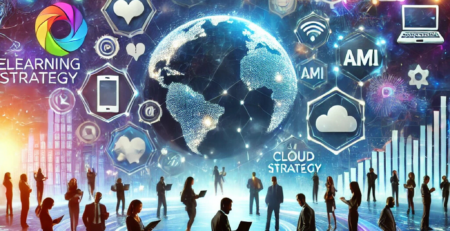How AI Is Revolutionizing Corporate eLearning Development
The world of corporate eLearning development is no stranger to technological advances. Recently, Artificial Intelligence (AI) has burst onto the scene with a transformative impact that cannot be overstated. This isn’t just about making things faster or cheaper. According to a report by MarketsandMarkets, the AI in the education market is projected to grow from $1.1 billion in 2019 to $25.7 billion by 2030, emphasizing its meteoric rise and importance. You might be wondering, why the significant leap? Let’s dive in!
Introduction to AI in Corporate eLearning
AI is not just a buzzword—it’s a game changer for eLearning course development. It’s helping to tailor learning experiences in ways we never thought possible. Imagine a custom elearning development program where content adapts instantly to each learner’s needs. This personalized approach ensures learners comprehend complex materials at their pace. Amazing, right? AI’s role in shaping eLearning solutions extends beyond simple automation. It involves making learning experiences more interactive, insightful, and impactful.
The Impact of AI on Custom eLearning Development
Artificial Intelligence is at the forefront of creating custom elearning solutions that deliver a personalized experience for each learner. Let’s explore how AI is influencing elearning developers and the broader industry.
Personalization and Adaptation
AI algorithms analyze learner data, assessing patterns and preferences to create individualized learning paths. For instance, an articulate storyline developer can use AI tools to design courses that adapt based on the learner’s progress. This concept of dynamic learning paths is revolutionizing how companies approach eLearning solutions. Instead of a one-size-fits-all approach, AI enables courses that adjust to a learner’s skill level, ensuring that no one is left behind or unchallenged.
Enhanced Engagement
Interactive and engaging content is crucial for effective elearning course development. AI and machine learning can incorporate advanced simulations, chatbots, and interactive quizzes to keep learners engaged. These elements transform static content into rich, immersive experiences that facilitate deeper understanding.
For example, chatbots serve as 24/7 virtual assistants, ready to answer questions and provide feedback. By integrating AI, elearning companies can ensure continuous engagement, making the learning process enjoyable and effective.
How AI Supports Elearning Developers
AI is not just benefiting learners—it’s also a boon for those behind the scenes crafting these experiences. Let’s discuss how AI is streamlining the work of elearning developers.
Efficiency in Content Creation
Content creation can be time-consuming and often requires repetitive tasks. AI can automate many of these processes, allowing elearning providers to focus on creating high-quality, engaging content. For example, AI-driven platforms can generate quiz questions automatically based on course material, saving elearning developers valuable time.
Predictive Analytics for Better Outcomes
Predictive analytics, powered by AI, provides insights into learner behavior. Collecting data through user interactions enables elearning companies to predict which sections of a course might cause difficulties or where learners might lose interest. By identifying these trends early, developers can modify content proactively, improving the overall effectiveness of the elearning course development.
The Rise of AI-Assisted Learning Platforms
AI is not just about improving existing platforms; it is also giving rise to new learning management systems equipped with AI capabilities. These next-generation platforms are designed to be scalable, adaptable, and intelligent.
The Role of AI in Learning Management Systems (LMS)
AI-powered LMS platforms offer personalized dashboards, intelligent content recommendations, and real-time feedback. These tools help both learners and administrators by providing actionable insights into personal progress and organizational trends.
For example, some elearning providers have integrated AI to assess learner engagement levels, suggesting optimal times for study sessions or recommending additional resources when performance dips.
The Future of AI in Elearning
The integration of AI in corporate eLearning development is an ongoing process, with endless possibilities on the horizon. Predictive personalization, sophisticated analytics, and seamless integration of AI tools will continue to evolve, pushing the boundaries of what’s possible.
The future of AI in eLearning holds promise for even more advanced simulations, virtual testing environments, and smarter content recommendation engines. As AI technology advances, so too will the effectiveness and accessibility of elearning solutions.
Conclusion
AI is indeed revolutionizing corporate eLearning development, transforming the way we learn and teach in unprecedented ways. These innovations are not just about modernizing education; they are about creating a future where learning is more accessible and tailored to individual needs. As AI continues to evolve, so will the capabilities of elearning companies, paving the way for a more knowledgeable and skilled workforce. The change isn’t just coming—it’s already here!
Stay ahead of the curve, and let AI drive your organization’s learning and development towards uncharted territories!












Leave a Reply